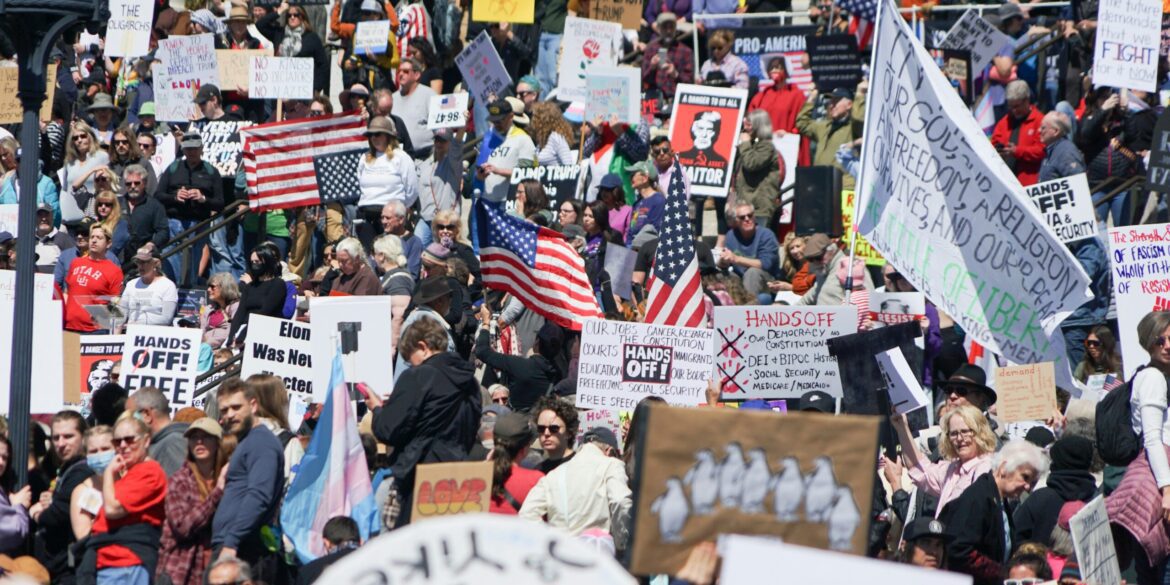On June 11, 2025, cities across the United States witnessed a surge in protests as citizens rallied against the federal government’s intensified immigration enforcement policies. In Los Angeles, demonstrators clashed with law enforcement following ICE raids targeting undocumented immigrants, leading to numerous arrests and injuries. Similar protests occurred in New York, Chicago, and Seattle, highlighting widespread dissent against the administration’s approach to immigration. Civil rights groups have condemned the use of military force in civilian areas and are calling for comprehensive immigration reform that respects human rights and due process.
Protests Sparked by Aggressive ICE Raids
The protests were ignited by a series of aggressive raids conducted by Immigration and Customs Enforcement (ICE) agents across Los Angeles. Between June 6 and June 8, ICE, supported by federal and local agencies, carried out coordinated operations targeting workplaces and public spaces known for large immigrant populations, including the Fashion District and various day labor centers. These raids resulted in the arrest of 118 individuals and were met with immediate backlash from the community. Demonstrators gathered at key locations, including the Federal Building in downtown Los Angeles, to protest what they viewed as inhumane and unconstitutional actions by federal authorities.
Deployment of Military Forces Escalates Tensions
In response to the escalating protests, President Donald Trump ordered the deployment of 4,000 National Guard troops and 700 Marines to Los Angeles, invoking Title 10 of the U.S. Code to federalize the California National Guard without the consent of state authorities. This marked the first such federalization since the 1992 Los Angeles riots. The Trump administration justified the move as necessary to restore order and protect federal property. However, critics argue it represents a dangerous overreach of executive power and a violation of state sovereignty.
Civil Rights Groups Condemn Use of Military Force
Civil rights organizations have raised concerns about the potential violation of constitutional rights and the use of military force in civilian contexts. The American Civil Liberties Union (ACLU) and the Coalition for Humane Immigrant Rights of Los Angeles (CHIRLA) have condemned the raids as “paramilitary operations” and accused ICE of terrorizing immigrant communities. Reports have surfaced of detainees, including children, being held overnight without access to food, water, or legal counsel. These groups also criticized the Los Angeles Police Department (LAPD) for assisting federal agents, arguing that such actions violate the city’s sanctuary policies.
Nationwide Spread of Protests
The unrest in Los Angeles has sparked a wave of protests across the country. Demonstrations have erupted in major cities, including New York, Chicago, Seattle, and Washington, D.C., with citizens expressing solidarity with Los Angeles and opposition to the Trump administration’s immigration policies. In Seattle, protesters set fire to a dumpster in front of the Henry M. Jackson Federal Building, while in Chicago, demonstrators marched through downtown streets. These protests have been largely peaceful, though some have resulted in clashes with law enforcement and arrests.
Political and Legal Responses
California Governor Gavin Newsom and Los Angeles Mayor Karen Bass have vehemently opposed the federal deployment, labeling it unlawful and inflammatory. Governor Newsom filed an emergency motion in federal court to block the use of military forces in immigration enforcement operations, arguing that the deployment violates the Posse Comitatus Act, which restricts the use of federal military personnel in domestic law enforcement. Mayor Bass echoed these concerns, stating that the presence of armed troops on city streets undermines community trust and exacerbates tensions.
Impact on Immigrant Communities
The raids and the heavy law enforcement response have had a profound impact on immigrant communities. Many individuals are now afraid to go to work, school, or even public spaces, fearing arrest or violence. Civil rights groups have reported cases where detainees were held without access to basic needs or legal representation, raising concerns about violations of due process. The use of tactical vehicles, riot gear, and “less-lethal” munitions has raised questions about the militarization of immigration enforcement and the potential for violent confrontations between protesters and law enforcement.
Calls for Comprehensive Immigration Reform
As the situation continues to unfold, civil rights organizations and immigrant advocacy groups are calling for comprehensive immigration reform that respects human rights and due process. They argue that the current enforcement policies are not only inhumane but also ineffective in addressing the complexities of immigration. These groups are urging lawmakers to consider policies that provide a pathway to citizenship for undocumented immigrants and that prioritize the humane treatment of all individuals, regardless of their immigration status.
The nationwide protests highlight the deep divisions in the country over immigration policy and the role of federal authority in enforcing it. As legal challenges proceed and demonstrations continue, the nation grapples with finding a balance between enforcing immigration laws and upholding the rights and dignity of all individuals.

